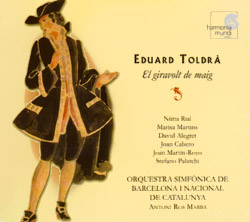Harmonia Mundi France

El giravolt de
maig
Òpera Còmica
Music:
Eduard Toldrà
Text: Josep Carner
Cast: Rosaura – Núria Rial
(soprano); Jovita – Marisa Martins (mezzo soprano); Golferic –
David Alegret (tenor); Voice of a Shepherd / Marcó – Joan Cabero
(tenor); Corvetó – Joan Martín-Royo (baritone); Perot
– Stefano Palatchi (bass); Orquestra Simfònica de Barcelona i
Nacional de Catalunya, c. Antoni Ros Marbà
[ rec. Auditori Nacional, Barcelona, 07/06]
Harmonia Mundi France (2-CD)
[TT=80:36]
Sung in Catalan. Notes and libretto in Catalan,
with Spanish translations
 Everyone in El giravolt
de maig (“The May Change”, 1927) dreams of being someone else.
The waiter at the Pyrenean mountain inn wants to be a soldier, the Hostess
wants to be a bandit queen whilst the bandit yearns to be a simple innkeeper.
The young seminarian is on the run disguised as a gentlemanly Don Juan, the
novice nun to whom he makes love is in fact a popular Barcelona ballerina. Yet
on this magical May night romantic dreams can become reality, if only for a
moment – giravolt (“somersault”) can also mean a
sudden turn or change of direction.
Everyone in El giravolt
de maig (“The May Change”, 1927) dreams of being someone else.
The waiter at the Pyrenean mountain inn wants to be a soldier, the Hostess
wants to be a bandit queen whilst the bandit yearns to be a simple innkeeper.
The young seminarian is on the run disguised as a gentlemanly Don Juan, the
novice nun to whom he makes love is in fact a popular Barcelona ballerina. Yet
on this magical May night romantic dreams can become reality, if only for a
moment – giravolt (“somersault”) can also mean a
sudden turn or change of direction.
With its gentle, romantic ironies Carner’s libretto provided the perfect canvas for Toldrà’s poetic gifts. The atmosphere of summer night in the mountains is drawn with a subtle harmonic palette and sensitive orchestral colour, St John’s Night from Die Meistersinger crossed with Songs of the Auvergne. Characterisation is understated, even the fearsome bandit Perot coming over as a pastel-shaded cousin to Bizet’s smugglers. The score is nicely poised between popular folklore and 18th century dance forms, but at its heart Toldrà evokes a world of delicate comedy which is not quite like anything else in opera. The nearest equivalent would be Nielsen’s Maskarade, another lovely piece which has found it equally hard to travel beyond native boundaries. Perhaps its awkward length and one-act form put managements off; but beyond that there’s a lack of populism about Toldrà’s fragrant score which doubtless tells against it.
Let’s hope that this excellent new recording achieves a wider distribution than its predecessor, recorded in 1968 and reissued on CD in 1995 by the Catalan Department of Culture to celebrate the composer’s centenary. Forty years on, the conductor is unchanged. Ros Marbà’s pellucid balance and pacing of the score are every bit as satisfying, the playing is if anything superior, and the recording fuller and warmer without any loss of clarity. There is less sense of theatricality, though, notably at the very beginning where Toldrà’s magically distant Shepherd voice is belted out right in one’s ear. Why? There’s also a marginal loss of wit and freshness to some of the characterisation, with Stefano Palatchi ’s woolly bass bandit falling below the level of Raimundo Torres all-bark-no-bite comedy bluster in the 1968 set.
Having said which, the new account is in the main extremely well sung, boasting a fine pair of masquerading young lovers in David Alegret ’s virile but sensitive Golferic and Núria Real’s outstanding Rosaura. Her smooth, even vocal lustre, perfect technique and engaging musicality made me sit up and take notice: I’d be surprised not to hear much more of her on the international stage. Harmonia Mundi’s booklet provides attractive colour reproductions of the original costume designs. The pity is that they provide only Spanish translations of the notes and Carner’s richly poetic text, a baffling decision for an international company with high artistic ideals, and one which does nothing to promote Toldrà’s beautiful work beyond Iberian borders. With not even a French/German/English synopsis to be had, it looks as if El giravolt de maig is fated to remain a hidden Catalan treasure.
© Christopher Webber 2008
![]() en
español
en
español![]() review (2003
Sabadell)
review (2003
Sabadell)![]() cd
magazine
cd
magazine![]() zarzuela
homepage
zarzuela
homepage
21 April 2008